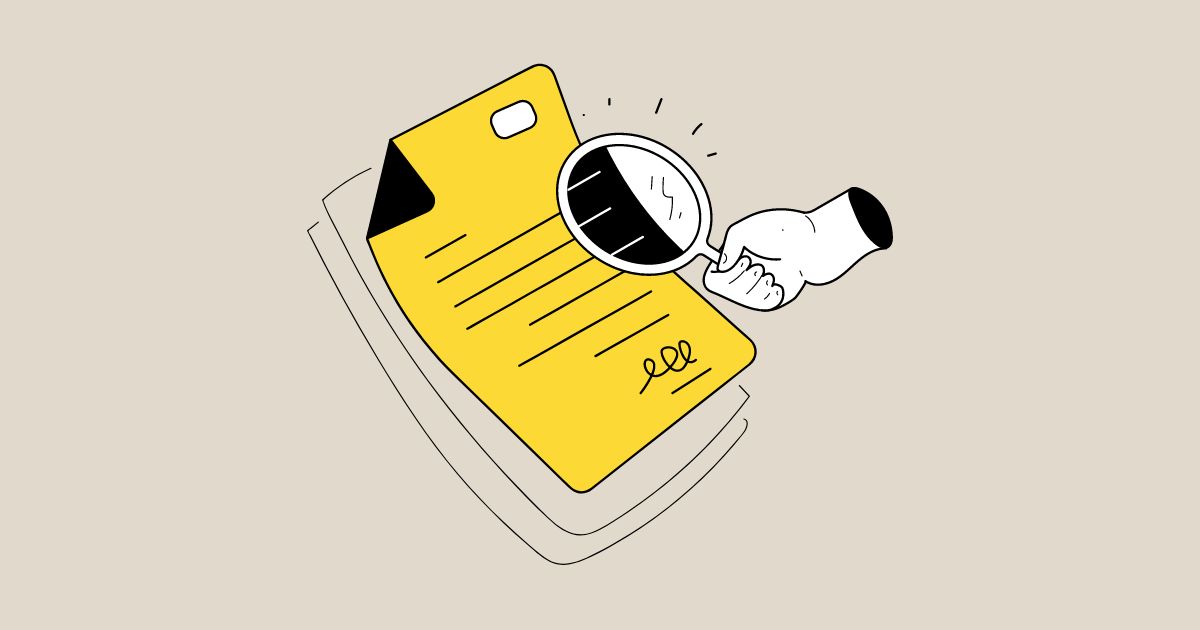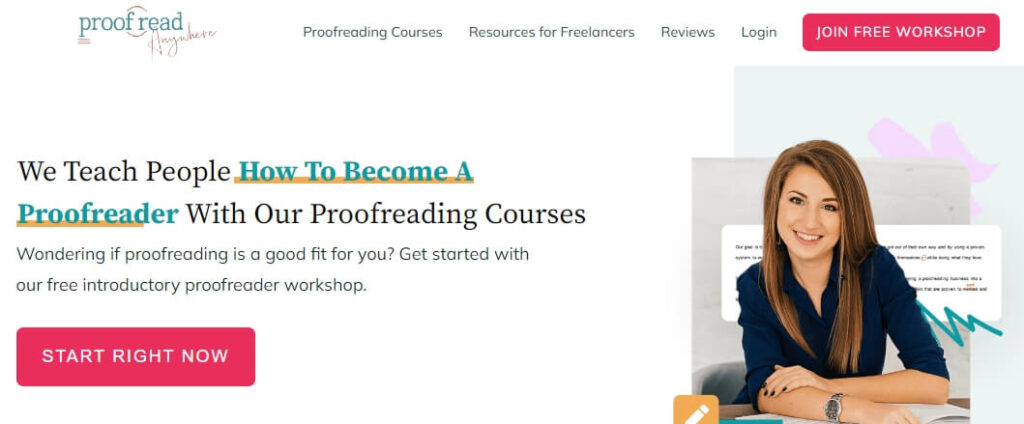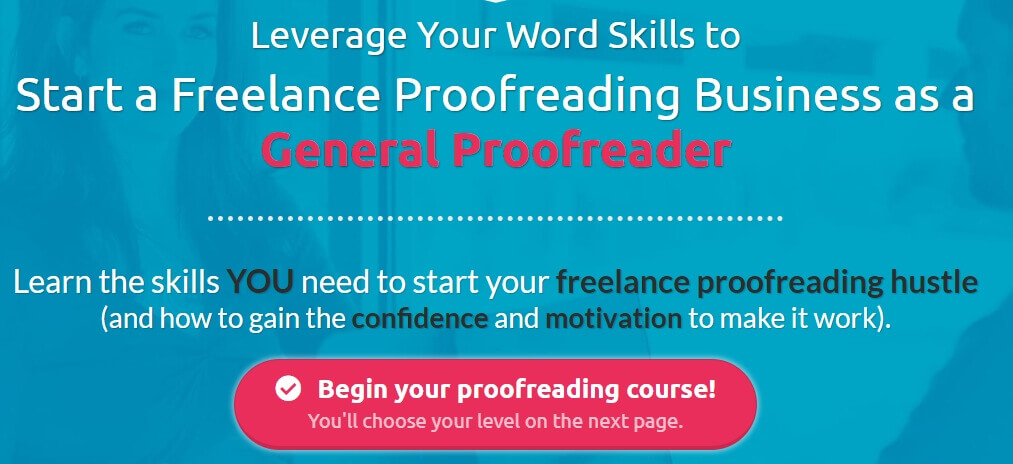How To Become a Proofreader With No Experience

This post may contain affiliate links which means that sproutinue.com may make a small commission at no extra cost to you. We only promote products that we love and feel will benefit our readers. Please read our Disclosure Policy for more information.
If you enjoy reading and have a keen eye for spotting grammatical errors, becoming a proofreader could be your perfect career.
And if you’re wondering how and where to begin, I’ll cover everything you need to know how to become a proofreader, including the earning potential and the qualifications required.
Whether you’re looking to supplement your day job or turn proofreading into a full-time income source, this post is tailored to your needs.
Let’s dive right in to determine whether proofreading aligns with your career goals.
But if you’re in rush, you can enroll in a free proofreading workshop to determine if it’s the right side hustle idea for you.
What Does a Proofreader Do?
Before I discuss how to become a proofreader, it’s good to know what the job entails.
Imagine reading a text where the author uses “there” instead of “their” or “your” instead of “you’re” throughout. You’ll likely be bored by the third paragraph. This is why proofreading is important.
Generally, a proofreader refines documents to remove errors before publication. Proofreading is the last step of the writing process.
As a proofreader, you check for spelling, punctuation, formatting, syntax, and grammar errors.
You must also ensure the documents are consistent with the required styles, visual elements, and language while maintaining coherence and the desired professionalism.
You can work on different types of documents, including these:
- Blog posts
- Manuscripts
- Academic papers
- Magazine articles
- Textbooks
- Novels
- Resumes
Proofreading isn’t limited to human content alone. Proofreaders also review AI-generated content to give it a more natural voice.
AI is efficient and fast, but its content isn’t foolproof. It may contain a few errors or may not be specifically tailored to the intended audience.
That’s where you come in! It’s your job as a proofreader to give the human touch to AI content and use a language that resonates with the target audience.
Enroll in a free proofreading workshop!
What’s the Difference Between Proofreading and Copyediting?
Many people often confuse copyediting with proofreading, but the two have distinct roles in writing.
While both involve combing through documents to rectify common errors, copyeditors work hand in hand with the author to verify facts and preserve the author’s voice. They also organize the content to ensure good readability and flow of ideas.
On the other hand, proofreaders simply rectify the surface-level mistakes without restructuring the work extensively.
Copyeditors review the work before the proofreaders. You can do both or specialize in proofreading if you want to work fewer hours.
Generally, copyediting takes longer and pays more than proofreading. According to Indeed, a copy editor in the US earns an average of $44 hourly, almost twice a proofreader’s average hourly salary.
What Skills Do You Need To Become a Proofreader?
Whether you have an educational background or not, possessing the following skills is vital for success as a proofreader:
- Keen attention to detail
- Good communication skills
- Familiarity with software like Google Docs, Excel, and Word
- Great research skills
- Flexibility and adaptability
- Excellent marketing skills
- Ability to keep up with trends
- Extensive knowledge of writing styles like Chicago, APA, MLA, or any custom style a client needs.
- Patience
- Good time management skills
The most important skill to have as a proofreader is the ability to spot errors from a mile away. For this, you must pay attention to detail.
The good thing is you don’t need to know everything right off the bat. You can master these skills with a bit of practice.
I’ll discuss some useful resources you can use later in this article.
What Qualifications Do You Need To Become a Proofreader?
A degree in a related field like English, communication, or journalism may give you a competitive edge, but it isn’t necessary.
The availability of free and paid online materials makes it possible to become a successful proofreader without a formal education.
However, you need a post-secondary education to specialize in a particular field. For instance, clients will trust you more as a medical proofreader if you have an educational background in the medical field.
How Much Do Proofreaders Make?
How much you earn as a proofreader depends on the direction you take.
You can work for companies at a price set by them or become a freelancer and enjoy the freedom of setting your rates in line with your experience and expertise.
According to ZipRecruiter, the average proofreader in the US earns about $28 hourly. This figure falls between a minimum of $13.70 and a maximum of $43.99.
Say you earn $28 hourly and work only four hours daily; that would translate to $3,360 monthly and $40,320 annually.
In fact, Caitlin Pyle from Proofread Anywhere earned $43,000 in the first year of proofreading.
Do You Need Certification To Become a Proofreader?
No, you don’t need certification to succeed as a proofreader. You can start bidding for jobs if you have the required skills and the patience to trust the process.
However, many people are getting into proofreading due to the huge demand in the industry. You must find ways to stand out and make up for lacking a degree.
Here are some ways to make it despite the competition:
Have a Good Command of the Language
Having a good command of the language and understanding basic grammar and syntax rules is vital to stand out as an excellent proofreader.
Language proficiency helps you identify errors quickly and maintain clarity and consistency throughout the document in line with the client’s needs.
Love To Read
Reading is the core of proofreading. You must go through word by word to deliver high-quality text.
As a proofreader, you’ll spend most of your time reading. You may also need to reread documents severally to find errors you may have overlooked.
There’s honestly no way around this if you want to excel and achieve the highest income potential as a proofreader.
Excellent Time-Management Skills
One way to gain clients’ trust and confidence is by delivering high-quality work within the stipulated timeframe.
Working from home is excellent since it helps you earn money while caring for your family and other home affairs. However, you can easily get distracted.
Set up a small office where you can work for a specific amount of time daily without distractions. Maintaining this kind of discipline will help you meet deadlines effectively.
Willingness To Learn and Improve
You must be willing to learn and improve to excel in any career, not just proofreading. The journey to success requires patience and intentionality.
Yes, you don’t need a certification to become an excellent proofreader. But how do you elevate your career to its highest potential? How do you increase your pay to align with your financial goals?
The answer to these questions is quite simple: invest in yourself. Take a proofreading course on Proofread Anywhere and use reference books to widen your knowledge of writing styles.
How Do I Become a Proofreader With No Experience?
Like any other freelance skill, you can get started with no experience. However, I can’t fully emphasize the importance of intentionality and patience.
Starting as a beginner may be challenging initially, as most clients tend to trust you more if you have prior experience. However, that doesn’t mean it’s impossible. Even the most successful proofreaders started from somewhere.
Even without experience, you can make it as a proofreader in the following simple steps:
1. Find a Niche
A major perk of proofreading is massive demand across different niches. Specializing in a particular niche helps you improve the quality of your work and position yourself as an expert.
The more your expertise in a particular niche is recognized, the higher your chances of landing more proofreading jobs with better pay.
Consider the subject and format as you select a niche. Some of the highest-paying proofreading niches include:
- Health
- Education
- Finance
- Fitness
- Medical
- Law
Once you choose a specific subject, you can narrow it down to one of the following formats:
- Novels
- Blog posts
- Biographies
- Handbooks and manuals
- Screenplays
- Resumes
- Legal documents
The best way to identify your niche is by working across different niches as a general proofreader. This way, you can maintain your income as you build connections with your target audience.
Remember, proofreading involves a lot of reading. Therefore, your passion is the most important factor to consider when choosing a niche. Don’t choose something you’ll get tired of in the long run.
2. Familiarize With the Rules
Familiarizing with proofreading rules is essential to making it in the field. You must understand basic grammar and syntax rules, tenses, and sentence structure.
You should also understand punctuation and how to spot common errors people make when writing. For instance, you must be able to tell the difference between “its” and “it’s”.
You must also ensure hyphenation and capital letters are used correctly. Another common proofreading rule is in formatting.
Familiarize yourself with common writing styles like APA, MLA, and Chicago. You must also be flexible enough to apply a writing technique customized by the client.
There are many important rules to familiarize yourself with; this is just the tip of the iceberg. However, don’t pressure yourself into learning everything at once. You can learn other rules on the job.
3. Create a Portfolio
A well-curated portfolio helps you showcase your work to potential clients. You don’t need experience to create the perfect portfolio.
Simply put the rules you’ve learned into practice by drafting a few projects to showcase to potential clients to land your first job.
You can create a website, upload your portfolio, or submit samples to clients as you bid for jobs.
4. Bid for Jobs
You can work for companies or as a freelance proofreader if you want more freedom over your rates and schedule.
Once you create a portfolio, it’s time to seek jobs and turn proofreading into a reliable side hustle idea in line with your goals.
You can find gigs on job boards like LinkedIn, Glassdoor, and FlexJobs. Websites like Upwork and Fiverr may be helpful if you want to freelance.
Start with the entry-level jobs, then upgrade to intermediate and expert levels as you hone your skills further.
5. Market Your Skills
Marketing your skills as a freelance proofreader helps you widen your reach and land more clients.
The first step is creating a website and linking it to social media platforms like Facebook, Instagram, and Twitter.
Another way to gain more clients is by word of mouth. Let your friends and family know about your services so they can refer you to a client or hire you when they need a proofreader.
You can also market yourself by starting a proofreading blog. Update the blog regularly and optimize it for SEO to attract more clients.
Using paid ads on social media and popular magazines is also an effective marketing strategy. However, stick to the free options if you don’t want to spend money initially.
6. Respond To Clients Fast
Engage with potential clients by answering emails and social media comments quickly. Failing to do so may make them feel ignored, making them find other proofreaders.
Prompt responses are part of good customer service. Anyone impressed with your communication skills and services won’t mind leaving a 5-star rating.
Enroll in a free proofreading workshop!
Tools You Need To Become a Successful Proofreader
Here are some tools you need to become a successful proofreader. Most of them are free, but some require a small fee.
- Google Docs: This platform lets you easily create, edit, and share documents. I use it often. It enables you to open Gmail files directly, share your work with the client, and leave comments efficiently.
- Microsoft Word: Like Google Docs, Microsoft Word lets you easily edit files. It has a spelling and grammar checker to help you work faster.
- Grammarly: This AI tool is useful in identifying grammar and spelling errors. You can also use it to resolve sentence-structure issues to improve readability.
- Hemingway App: Another tool you need in your arsenal. It highlights complex sentences and common errors and suggests alternative words to reduce ambiguity.
Extra Reading – Part-Time Night Jobs from Home
Are Proofreading Courses Worth It?
Proofreading courses are worth it if you want to become a professional proofreader and reach your highest income potential.
They help you master basic proofreading skills and find unique ways to stand out amid the competition. I highly recommend Proofread Anywhere if you’re considering a proofreading course.

Proofread Anywhere offers a free workshop to help you determine if proofreading is right for you before committing to paying for one.
It offers two paid, affordable courses for beginners and experts in the proofreading field. Here’s a breakdown of the courses to help you determine if they’re worth your time:
1. General Proofreading: Theory and Practice
The General Proofreading course on Proofread Anywhere is specifically designed for people who want to build a proofreading career from scratch.
It takes you through the basics of proofreading and how to establish yourself in the industry. The General course also provides insights into the best ways to market yourself and build a loyal client base.

The course material includes practice essays, assignments, graded exams, and reference books you can utilize to kickstart your career.
It also sheds light on how to build and promote your website to gain more clients as you advance to the expert level.
The General Proofreading course is organized into eight modules with over 40 lessons. It’s self-paced, but you can complete it in a month if you’re serious about proofreading.
There are two subscription tiers you can use to access the General Proofreading course:
- Ignite: $697
- Ignite Plus: $797
The Ignite Plus subscription contains everything in the Ignite plan, plus a hand-graded exam, a digital certificate of completion, and membership in an exclusive marketing group.
2. Transcript Proofreading: Theory and Practice
This is the second course Proofread Anywhere offers. It’s the perfect option if you want to delve into legal proofreading.
As a transcript proofreader, you’ll review legal proceedings to ensure they’re error-free and the speakers’ voices are preserved.
The course costs only $997 and contains 60 lessons across 13 modules. It offers numerous resources to help you specialize in a particular proofreading niche.

Other perks of enrolling in this course include:
- Access to a student community
- Digital certificate of completion
- Two hand-graded exams
- 50 practice scripts
- Access to a graduate-only community
- A badge
Transcript proofreading has a higher income potential than general transcription. However, the latter is the best place to start if you’re a beginner.
Still not sure whether you should take Proofread Anywhere’s courses? They offer a free workshop to help you determine if proofreading is for you and whether to take the classes.
At least you’ll lose nothing by trying!
How To Find Proofreading Jobs From Home
Working from home as a proofreader is easy with a computer and reliable internet. Plenty of free freelance sites exist if you want to work from home.
All you have to do is sign up on your preferred platforms and apply for jobs. Ensure to submit your portfolio to increase your chances of landing a job.
Here are some of the best places to find proofreading jobs from home:
- Upwork: Upwork is an excellent freelancer platform where you can land proofreading jobs depending on your level of expertise.
- Fiverr: This platform is similar to Upwork.
- LinkedIn: Most proofreaders on LinkedIn charge by word. The pay ranges from $0.0025 per word for beginners to $0.01 per word for experts.
- FlexJobs: This job board is similar to LinkedIn and is a fantastic place to start if you want to excel as a proofreader.
- Reddit: You can find jobs on Reddit’s online communities. The r/For Hire subreddit is one such place for proofreading jobs.
- Facebook: Like Reddit, Facebook has community forums where you can find virtually anything, including proofreading jobs.
- Indeed: This job board also advertises proofreading jobs for beginners, intermediate, and expert proofreaders.
With my experience as a work-from-home freelancer, I find the idea of stacking multiple sites convenient and effective in achieving my financial goals.
Don’t just submit one application on Upwork and give up. Increase your chances of making substantial income online by bidding for proofreading jobs on multiple sites simultaneously.
Frequently Asked Questions
Is Proofreading Still in Demand?
Proofreading is still in demand. In fact, the market has expanded significantly due to an increase in written and print texts.
There’s the fear that AI and proofreading software pose a threat to proofreaders.
For now, one thing is certain. The current AI and proofreading tools can’t compete with the invaluable qualities like human judgment and adaptability human proofreaders offer.
So, if you’re skeptical about proofreading as a career, plenty of jobs out there. Simply gain the necessary skills and start applying for gigs!
Is Proofreading a Difficult Job?
No, proofreading isn’t a difficult job. You can easily do it from the comfort of your home as long as your internet is reliable and you have a good computer.
Landing your first gig won’t be a walk in the park. That’s the reality of starting any job, not just proofreading. Patience and consistency are essential, especially as you begin your career.
Does Proofreading Pay Well?
Yes, proofreading pays a decent salary, and you can turn it into a full-time venture if you have ample time to handle several tasks daily.
On average, a proofreader earns between $20 and $30 hourly, depending on expertise and the length of the projects. You can make more if you establish a solid customer base and hone your skills to an expert level.
How Do I Get Started in Proofreading?
Getting started in proofreading is simple. You can do so in the following steps:
- Find a profitable niche
- Acquire the required skills
- Create a portfolio
- Apply for jobs
- Market your skills
Final Thoughts
Now that you know how to become a proofreader, it’s time to give this side hustle idea a chance.
Remember that finding the first client may take some time, but proofreading is worth it if you’re intentional, patient, and consistent.
Utilize free online resources to hone your skills, or enroll in a free workshop on Proofread Anywhere if you need more guidance.
With the right attitude, you can master proofreading and stretch to your maximum potential in no time!




